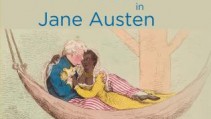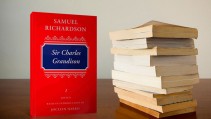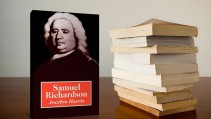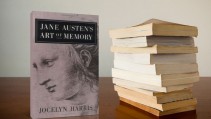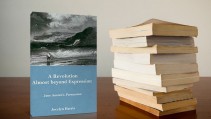Recently, renowned New Zealand writer Fiona Farrell gave the University of Auckland’s lecture at the 2018 Auckland Writers Festival, speaking on the political in literature, sometimes where we least expect it. You can read her fiery, wide-ranging and compelling lecture here, as well as listen to it via podcast. Farrell mentioned Satire, Celebrity and Politics in Jane Austen, and here’s an extract of some of that content:
The political dimension to a writer’s work is not always as evident as in Vogel, Orwell, Atwood, Stead. Jane Austen, for instance?
In the 2000s, she’s white muslin, wet shirts and simpering sex. But in one of the most interesting books I’ve read this year by a New Zealand writer, the Otago academic Jocelyn Harris strips away the muslin. In Satire, Celebrity and Politics in Jane Austen, Harris exposes a writer who was far being the cloistered aunt insisted upon by her nephew and first biographer, but keenly interested in politics, from her earliest scribblings to her final work. It’s a poem written just three days before her death, her skin already richly marbled black and white with decay. It’s a poem, a jaunty little ditty, about the cancellation of the Winchester races.
They were an institution on the aristocratic calendar, like Ascot, but in 1817, a volcano in distant Indonesia had exploded, the ash cloud hung heavily over Europe bringing storms, disastrous crop failure, starvation, riot. In Winchester, the ‘Lords and the Ladies [all] sattin’d and ermin’d’, were assembled, writes Austen, but their revels are ended when the city’s Saint Swithin sends torrential rain as a rebuke to their dissolution: ‘By vice you’re enslaved. You have sinn’d and must suffer!’
Chief among the dissolute was the Prince Regent, charged in his father’s madness with ruling the country, and a man Austen privately confessed to ‘hate’ – and that was not a word she used often or lightly.
She was not alone. He was widely loathed, lampooned in a new and popular print medium, the satirical cartoon, as an extravagant, grotesquely bloated libertine. Austen had access to these, along with that other dramatic new post-revolutionary medium, the newspaper, with its apparatus of editors and journalists and its columns of print critiquing the events of ‘le jour’, the day, in that blissful dawn when the three old estates, clergy, nobility and commons, were being shoved aside by that crude arriviste, the fourth estate.
She lived in a turbulent era, of revolution, regicide, war, riot, famine, pervasive poverty. Laws were passed to curb dissent, rendering it a capital offence to ‘stir up dislike of His Majesty, his heirs or successors’ in speech or print, and the law was enforced. When the poet and journalist Leigh Hunt described the Prince Regent in his paper, The Examiner as ‘a corpulent man of 50… a libertine over head and ears in debt and disgrace… who has just closed half a century without a single claim on the gratitude of his country or the respect of posterity,’ he was sentenced to two years imprisonment and a fine of L1500.
His wife Marianne moved into gaol with him, along with three of their children, a four-year-old, a one-year-old and a newborn baby, and they painted the ceiling of their cell blue to look like the sky, but making fun of power was clearly not to be done lightly.
Harris’s meticulous book shows how Austen made her fun, encoding political comment in plot, setting, characters, sometimes in a single word. Just one example: when Sir Walter Eliot in Persuasion, fool and extravagant fop, cries, ‘Can we retrench?’, in that one word, ‘retrench’ contemporary readers would have heard the widely satirised cry of the Prince Regent when asked by parliament to reign in his borrowings from the public purse. ‘Must I then retrench?’ It’s as if I were to write a character of the past ten years who repeatedly uses the word ‘opportunity’ or ‘excellence’ – words politically loaded with a right-wing resonance that will, in a few years’ time, please god, be inaudible.
Novels stand outside time, with their narrative structure of beginning, middle and end. They outlast politics, which are by nature ephemeral, swift and changeable and can quickly become invisible, detectable only to the skilled eye.

